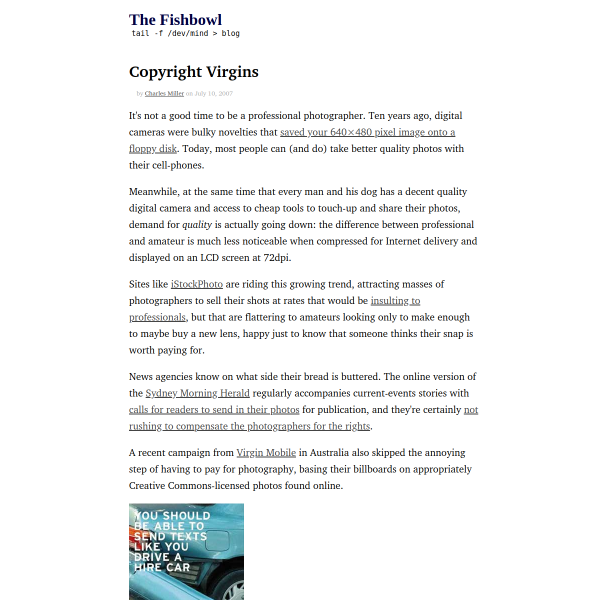After I tell two people an idea, it probably makes sense to publish it somewhere so that someone can go out and implement it. Here are the ingredients:
- a site powered by Drupal 4.7
- Location module for Drupal
- GeoRSS module for Drupal
- Aggregator2 module, though its successors are currently in heavy development
- A Nokia N95. Or any mobile device that combines GPRS, GPS, and a camera and a phone. The phone part is completely unnecessary, but that conveniently limits us to the Nokia N95.
- (optional) Google Maps and Views modules for Drupal
I say optional for the last one because you would only 'need' it to display a map on your own site. (Which I do: more on that later.) Some assumptions, using Vancouver as my example. Since we all have a natural urge to let complete strangers know not only that there's nobody back at home but also to let those same complete strangers where we are at all times, say I'm walking in Stanley Park and want to make a 'live' document, with a map, of the walk I'm taking. With photos and video, say. Say, also, that I have a reasonably-priced unlimited data plan, the same reasonably-priced unlimited data plan I moan and groan about not having. Here's what would happen:
- I would take a photo and automatically upload it to Flickr, the GPS taking care of the co-ordinates and geo-tagging as I walk around.
- Flickr then displays it on its map. That's really neat, but not the exciting part. In the RSS feed, Flickr adds the longitude and latitude to each photo's item.
- My Drupal-powered site takes in the RSS feed, and thanks to the Aggregator2 module + the Location module + the GeoRSS module, automatically adds the longitude and latitude to the individual item.
- I map it on my site using the Google Maps module. That's really neat too, but still not the exciting part.
- The GeoRSS module also adds longitude and latitude to my site's RSS feed.
That way someone could come along and use my liberal "Attribution" (no other restrictions) Creative Commons License and do something with it. Add it to a mapping aggregator (like mapufacture that displays crimes committed in Stanley Park, which would be so nuanced as to point out where crimes didn't happen. So hopefully, assuming the current odds of my being involved in a crime at any given moment, it will map out that data point at that particular moment.
We now come ever closer to having all the tools we need to not only document our environment, but to let others re-document it in different, unimagined ways. Right now the process is fairly time-consuming: before even knowing about GeoRSS, through a process involving manually looking at Google Maps of the area, then parsing out the Google Maps URLs for coordinates, I pasted in longitude and latitude for each station so far on my SkyTrain Explorer walks. That gets me a cute map of each walk (clicking on the label goes to the walk's individual page), and thanks to the SkyTrain walk feed (generated with the Views module) that contains geographical data (courtesy the GeoRSS module) you can get the points plotted on an external map. Which also happens to use Google Maps, but the point is that the service, through a standard to output location data in RSS and a few other pieces, someone else can use an external service or pull down my RSS feed and do something with my location data.
By few, of course, I mean "a lot of", since none of it comes out of the box, as you need to glue together a content management system, modules, and a little bit of manual labour. The Nokia N95 takes care of the manual labour part, and the wifi modem makes grumbling about lack of a GPRS plan almost pointless. (Almost.) It also takes out of the hard work of learning mapping, mobile devices, location-aware tools—and increasing my own location-awareness—as I try them out, since they'd all happen at once. And it would be fun!
I'm not worried that some evil-doer has, after reading the above, gained knowledge to hasten our doom. I'm 100% confident they would have figured that out for themselves.






